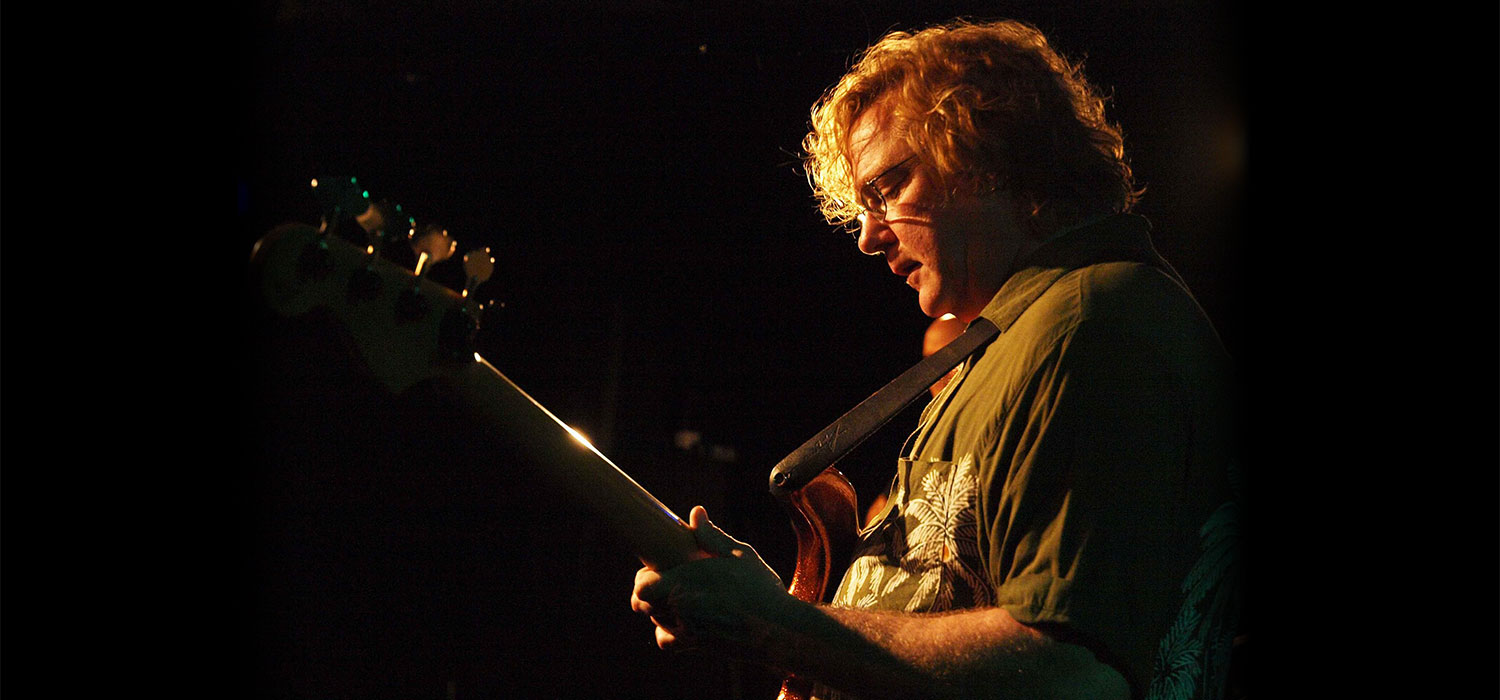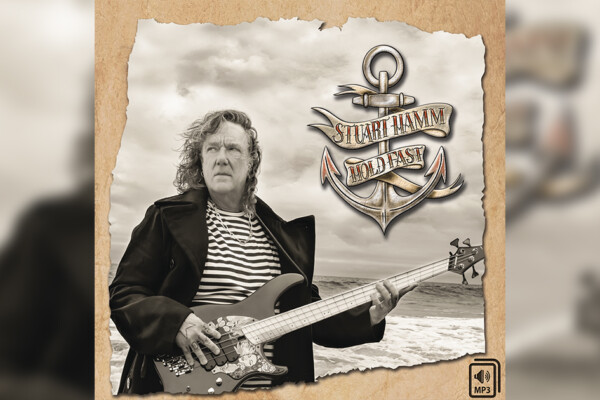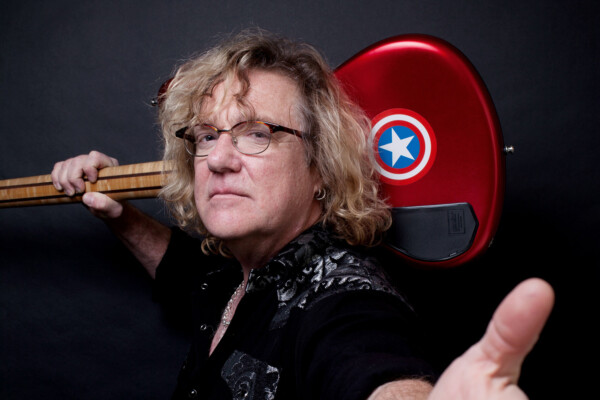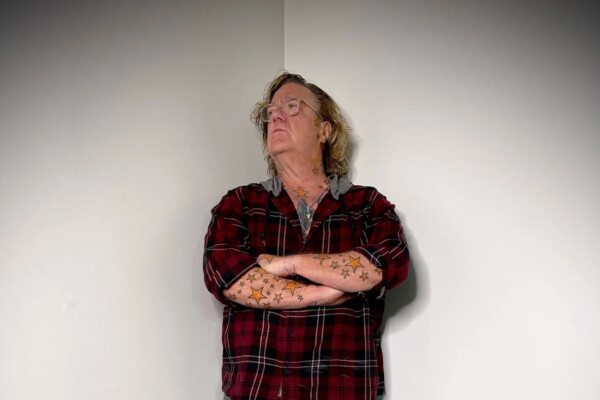An Exclusive Interview with Stu Hamm

Stu Hamm is a name synonymous with instrumental rock bass, but what you may not know is that the bassist himself has a very rich musical background, with interests spanning just about every genre and time period. Hamm recently unveiled proof of his diversity as well as his playing and compositional talents on his sixth solo album, Just Outside of Normal.
Besides the new record, he has a new Washburn signature bass guitar (called the Hammer!), which will be available this year.
We got the chance to talk with Stu after one of his rousing solo performances at the Samson/Hartke booth at NAMM this year to talk about his background, new album, new bass, and his future endeavors.
You just released your new album mid-December, but it’s been about ten years since your last studio album.
Yeah, well things got busy. You know I started the record in 2008 and I finally had the material together for it and the vision for what I wanted the record to be, and then I got a really late call from Satriani asking me to do his tour. So, I had to put everything on hold to unfortunately tour the world [laughs].
It was really a studio record. It wasn’t the kind of thing where I wrote some songs, got musicians and recorded. Because I think for a lot of my career, I’ve been trying to emulate the success of people whose bands I’ve been in, by trying to pattern my music a little more in the rock vein. This time I said, “you know what, I’m trying to find different ways to feature what I do on the bass in a musical setting.”
In instrumental rock, the bass is just kind of holding down the root, so that’s where Just Outside of Normal has a lot more piccolo bass, bass choirs and just compositions that use different instrumentation. It’s a real departure, but in many ways I feel it is my strongest… definitely my strongest record playing-wise, tonal-wise, or compositionally. It’s certainly a stretch. Not a whole lot of wankin’. There’s a little bit of wankin’ for my wankin’ fans, but there’s a lot of music on it.
You’ve got so much technique, do you have to censor yourself sometimes and listen back and say “Maybe I should tone that down”?
I’m mature and secure enough where I don’t really need to show off to myself or anyone else. It’s really all driven from the music. Now, where I need someone to help me is when to realize a take is a good take and has a good feel, when all I hear is fret-noise, and the D-string’s a little flat, or the G-string is sharp, and I’ll wanna do it over till it’s perfect but if you do that sometimes you’ll lose the feel. You can’t see the forest from the trees. That’s when you need a producer to say that’s a great take.
What’s your writing process like?
Every song is supposed to tell a story, and every song I play is about something… about a book I read, or a person I met, or a meal I had… you know, it’s about something emotionally. When I name a song is when it comes. I’ve got a ton of chord progressions and grooves, but they’re not a song until they are about something. Once they coalesce into something then it’s easier to write the song.
You said that you’ve opened up your playing and there’s a lot of diversity on the album. Do you feel it’s a better way to express yourself?
It’s a record. It’s a recording of the way I’m playing and the songs I’m composing in the year 2010. It’s no more than that. But you know, I certainly have matured enough where I let my songs develop more, and I’m certainly influenced by different stuff I’ve been listening to and stuff I listened to when I was younger.
As much as I love hearing great players play, if a record is only about the playing, and every song has the same instrumentation and the same mix – bass plays a burning bebop head, burning bebop solo, same sound of the drums – no matter how great the playing is, to me personally, after a while, I lose interest. For giving me fifty minutes of your time, I want it to be an interesting experience, an interesting ride from the time you put it on to the time you’re done, and then when you’re done you go “Wow!” Then you think about the record as a whole and go back to listen to parts of it or the whole thing again and make it like a journey. That’s really what I was going for… a concept record, man! [laughs]
About your musical upbringing, I read that you were into classical and funk, and not really into rock and Led Zeppelin until later.
Yeah, well I come from a whole family of musicians. My father was president of the American Musicological Association. I was exposed to lots of more classical music. And yeah, my idea of rock was like Yes. I didn’t get into Led Zeppelin and stuff until later. I was certainly more coming from playing in big bands instead of rock bands. I thought Maynard Ferguson was cool. The stuff I listened to was jazz and fusion.
I always liked the Who better than Led Zeppelin. That’s just me, and my opinion, which doesn’t mean anything to anyone but me!
You spent about 20 years with Fender. Tell us about your switch to Washburn.
I had been playing Washburn acoustic basses for a long time, and I love the sound and I love the company, but no one made an acoustic bass that had an adjustable, intonatable bridge. Unless you could raise the action up and down on the bridge – unless I could get the action where I wanted, unless I could intonate it where the G chord on the third fret was in tune with the G chord on the fifteenth fret – I couldn’t play my solo stuff on it.
So after years, we finally came up with the Washburn AB40SH that has the intonatable bridge. I like Terry Adkins, the designer, and we started talking about some different ideas I had for electric, so we put some stuff together. I worked very closely with Rob Turner from EMG, he called up this new pickup configuration, and it’s a whole new ballgame. One of the pluses is that I’m going through some real shoulder issues, and to have a bass that’s a little bit differently weighted [and] I wear differently, it’s using different muscles, so it’s not the same repetitive stress over and over.
What is your take on instrumental music fans around the world, as it seems as though there isn’t as much of an appreciation for it in the U.S. as there is abroad?
There’s no question about it. I’m not going to get into the discussion about the intelligence of a certain percentage of the American population, but you know no one rocks like America. No one can play the blues or jazz like Americans, but everyone can imitate it. I travel the world and I love it, and I love to travel with my family, but it’s my home, my country, and I love the U.S. But sure, it’s much more of a ‘show me now quick’ society… right now. Who’s to say? Hopefully it will change, but certainly for instrumental music and a lot of bands can’t get a [gig] in the States, where we do very well in Europe and Asia. That’s just the way it is right now.
Tell us about TracksByStu.com.
Remember Myspace? I have a lot of guys get in touch with me through Myspace and Facebook asking me to play on their tracks on their records and on their demos. So some friends of mine at Six String Media created this website called TracksByStu.com, where it makes it easy to [explain] what you need to have me play and upload, and what format you need it in. It’s been good. It’s funny, a lot of people send it to me and say ‘I want you to really do your thing,’ which means wank, and really it works better if I just play a simple bass line and make their song sound good. I usually send them two takes: one with all this crap on it, and one with me playing a simple bass line and they generally take the one that’s my first instinct. It allows me not to have to travel quite so much and I just get to play on a ton of different kinds of music.
Is there a chance that you’ll be touring behind your new record?
I certainly hope so. I’ve got a couple things in the works now that could be announced soon that would keep me from traveling, but if that doesn’t come through, I’m going to more aggressively put out putting a band together and touring with this. I’ve already got some offers in South America and Europe for this summer. The States again, it’s a hard sell.
If I try to tour this record, I would need an eight-piece band because of the instrumentation. I’d like to think that there are enough people that would come to see me play [to] support taking eight people on the road, but the reality is probably not. So, we’ll have to figure out some way to go about that. Samples… who knows? But there’s always ways to play and I just play because that’s what I do and I love it and I feel I’m always getting better and still have a lot to learn and still enjoy it, and it’s a challenge, so I’ll keep doing it!
What’s coming next for you?
I’m gonna finish up my third instructional DVD thing for TrueFire, so we’ll have all three of them and I’m working on some interesting online teaching stuff with them. I’ve got a bunch of tours and clinics and I have a couple irons in the fire that I can’t discuss right now, but hopefully will bank soon. But man, I’m just living in the moment, playing my bass enjoying the day.



